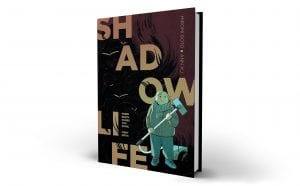As the world around us brims with loss and hard choices, we all need a hero. And that hero, as portrayed in writer and poet Hiromi Goto’s first graphic novel, Shadow Life, is a 76-year-old Japanese Canadian woman named Kumiko who finds herself immersed in a battle for her life.
The story begins as Kumiko, against her adult daughters’ wishes, goes on the lam from her assisted-living facility. She sets up a small apartment in the queer area of town and creates a quiet, satisfying life for herself (complete with lots of swimming) that is disrupted when Death’s shadow starts trailing her.
You may unsubscribe from any of our newsletters at any time.
Kumiko isn’t about to surrender, however. “She fights back by thinking creatively and drawing from old traditions,” says Goto. And this fight indirectly leads her back to an important person from her past.
More on Broadview:
- Why purity culture upholds the misogyny and anti-Asian racism of the Atlanta shootings
- Meet the director removing anti-Semitism from Oberammergau’s famous Passion play
- Poetry kept Pádraig Ó Tuama alive. Now he’s sharing it with everyone else.
Shadow Life’s free-spirited protagonist reflects Goto’s long-standing efforts to diversify Canadian literature. “It’s always been very, very important for me to have complex representation of Asian women in a North American context,” says Goto, who immigrated to Canada from Japan as a young child and grew up in British Columbia and Alberta.
Her first novel, Chorus of Mushrooms, was published in 1994 and tells the story of three generations of Japanese women living in the Canadian Prairies.
“For Shadow Life, I wanted to return to a central character who’s an older woman, because along with how Asian women have been represented, I’m also highly conscious of how elderly people or elders are represented,” she says. “Especially in popular culture, there is often a tendency to frame them as comical figures, a punchline of a joke.”
Goto’s grandmother Naoe lived with her family when she was growing up, and Goto keeps her spirit close. “I think a lot about my grandmother and wanted to bring my love of strong, complex, flawed women together with a delight [in] stories of the fantastic,” she says.

Another major influence on this book, which is illustrated by Ann Xu, was a manga comic series Goto read when she was young called Ijiwaru Baasan, about an older woman who causes mayhem everywhere she goes. “I loved that comic strip because she was so mean, and it was just awesome,” she says. “It was such a contrast to what I knew about being a good Japanese girl or a good Japanese woman.”
Inspired by how manga is read by people of all ages in Japan, Goto wrote Shadow Life with older readers in mind, “many of whom might not have tried the graphic novel form before as a serious piece of literature,” she says. To make it more accessible, she limited the text so that there aren’t long blocks of small-print narration. “The art is meant to convey the story and move it forward,” she explains.
She also hopes that this book will influence some readers in another way. “Maybe there’s a lot of older people who might not have many friends of colour,” she says. “And it’s important, especially for a white audience, to be expansive in their relations. A story is a soft way to enter that.”
Stories that introduce a new way of thinking stir a sense of wonder, Goto says, “like a window opening up in your mind.” Kumiko’s tale puts a fresh spin on the familiar, encouraging readers to appreciate the good in their lives. It’s also delightfully funny, because for Goto, “humour is a way to speak back to despair.”
The themes portrayed in Shadow Life are timeless, though they are sharpened by our current pandemic reality. As Goto writes in the book’s author’s note: “The future feels acutely uncertain in this moment. More of us feel closer to death than we have ever felt before….But it is possible to live vibrantly, even near Death’s shadow. Friendship, compassion, generosity and caring casts the brightest light.”
***
Alex Mlynek is a writer and editor in Toronto.
This story was first published in Broadview’s April/May 2021 issue with the title “Embracing the twilight.”














